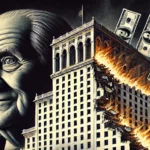The legal profession is a bastion of ethics, responsibility, and adherence to the rule of law. It is a field where trust and integrity must remain paramount. Yet, occasionally, the conduct of certain practitioners reveals a stark departure from these values, offering cautionary tales that reverberate across courtrooms and classrooms alike. One such story is that of Peter Gray, a once-rising star in the legal world who fell from grace in spectacular fashion.
Gray, a Dubai-based English solicitor and former partner at the prestigious global law firm Gibson, Dunn & Crutcher, has become synonymous with professional misconduct. His case is a stark reminder of the consequences of dishonesty in the legal profession. What began as a promising career ended in disgrace, professional disbarment, and the tarnishing of a law firm’s reputation.

Peter Gray
A Rising Star and a Fall from Grace
Peter Gray was, by all accounts, a high-flying legal professional. His expertise and work ethic earned him a coveted partnership at Gibson Dunn, a firm renowned for its global reach and storied history dating back to the late 19th century. Based in the UAE, Gray specialized in high-stakes litigation and represented powerful clients, including sovereign states. However, beneath the surface of his career’s glittering success lay a troubling willingness to forsake ethics for expediency.
Gray’s downfall began with his involvement in a case representing the Republic of Djibouti against Abdourahman Boreh, a wealthy businessman and opposition leader. The Djiboutian government accused Boreh of masterminding a grenade attack in 2009, using this allegation as the basis for seeking a freezing order on $100 million of Boreh’s assets. Central to the case were transcripts of phone conversations implicating Boreh in the attacks.
The Smoking Gun That Turned Against Gray
The case unraveled when it emerged that the phone transcripts relied upon by the Djibouti government were misdated. The calls, purportedly made after the attacks, had actually taken place the day before. This revelation undermined the government’s entire narrative, supporting Boreh’s claim that he was innocent and the target of a politically motivated smear campaign.
Shockingly, the inconsistency in the transcript dates was identified by a Gibson Dunn associate who brought it to Gray’s attention. Instead of acting with integrity and immediately notifying the court of the error, Gray chose a different path—one that would seal his fate. Rather than disclose the truth, Gray opted to “fudge” the evidence, a decision documented in meeting minutes.
Deliberate Deception
In 2015, the truth came to light during a hearing before London’s High Court. Mr. Justice Flaux found that Gray had deliberately misled the court by failing to correct the erroneous evidence. The judge’s scathing ruling described Gray’s conduct as a deliberate act of dishonesty. The freezing order against Boreh was promptly thrown out, and Gray’s professional standing began to crumble.
Gray’s actions did not merely reflect poorly on himself but also cast a shadow over Gibson Dunn. The firm, eager to distance itself from the scandal, issued a public apology and reported itself to the Solicitors Regulation Authority (SRA). Lord Falconer, a senior partner at the firm and former UK Lord Chancellor, was compelled to issue a groveling apology to the court on behalf of the firm and its client. The humiliation was compounded when Gray’s profile was erased from Gibson Dunn’s website, and his LinkedIn account was quietly deactivated.
The Disciplinary Tribunal’s Judgment
The Solicitors Disciplinary Tribunal (SDT) delivered its damning verdict in 2021. After a six-year saga, Gray was struck off the roll of solicitors in England and Wales. The tribunal found that he had knowingly and dishonestly misled the court by swearing a false affidavit, allowing misleading submissions to be made, and concealing the truth from opposing counsel.
The judgment painted a picture of calculated deceit. Gray had consciously decided to rely on the misdated transcripts to secure the freezing order, despite knowing their inaccuracies. The tribunal dismissed his defense, which included glowing character references and claims of a heavy workload. It ruled that his actions were driven by a “strategic decision” to mislead, rather than by error or oversight.
Repercussions and Lessons
Gray’s fall from grace serves as a cautionary tale for legal professionals worldwide. His case underscores the critical importance of honesty and transparency in the practice of law. The damage caused by his actions extends far beyond his personal career. It eroded trust in Gibson Dunn, forced the firm to endure public embarrassment, and cast a shadow over the legal profession as a whole.
For law students and young practitioners, Gray’s story is a stark warning. No amount of ambition, skill, or success can compensate for a lack of integrity. When faced with ethical dilemmas, the only viable path is to uphold the principles of truth and justice. As Gray’s case demonstrates, attempting to deceive the court is a gamble that leads only to ruin.
A Firm’s Reputation on the Line
Gibson Dunn’s handling of the fallout was a study in damage control. The firm’s leaders were quick to distance themselves from Gray, emphasizing that his actions did not implicate other team members. They initiated internal reviews, cooperated fully with regulatory authorities, and pledged to uphold the highest standards of professionalism.
Despite these efforts, the scandal left an indelible mark on the firm’s reputation. It served as a reminder that the actions of a single individual can have far-reaching consequences, not just for themselves but for their colleagues and clients.
Conclusion
Peter Gray’s story is a tragic example of how a promising career can be derailed by poor judgment and ethical lapses. His deliberate decision to mislead the court, driven by a misguided sense of loyalty to his client or a desire to win at all costs, ultimately destroyed his reputation and career.
For the legal profession, the case is a reminder of the high stakes involved in maintaining ethical standards. It underscores the necessity of transparency, accountability, and adherence to the rule of law. As future generations of lawyers study this case, the hope is that they will take its lessons to heart and strive to uphold the principles that define their profession. In the end, the court of public opinion—and the judgment of history—is unrelenting in its demand for integrity.







